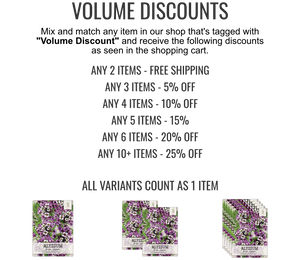Description
Chicory has light periwinkle-colored flowers that are similarly shaped to daisies. The blossoms are about .75 to 1.5 inches across, and the petals have a delicately toothed outer edge. The plant itself has tough, woody, hairy stems. The long, narrow, serrated leaves are a dusty green. If you break or cut the chicory plant, it will 'bleed' out a milky, bitter sap.
Chicory plants have a wide range of growth size, depending on growing conditions, and can be anywhere from 10 inches to over 3 feet tall. The stems on which the flowers grow can be a couple of feet taller yet, up to 5 feet.
Growth
Chicory is a hardy perennial herb native to Europe (probably France and Italy) or India. It is one of the earliest documented plants and has been used all the way back to ancient Egyptian times (and possibly farther, but documentation from that long ago is sparce), so it is difficult to pin down the exact area from which it originated. It is extremely useful, so it spread rapidly as far as people could carry the seeds. It has naturalized all over the United States, Eurasia, Africa and Australia.
In the wild, chicory is often found on roadsides or in scrubland, though it prefers well-drained soil with lots of organic material. Because of its large taproot, it is drought-tolerant but prefers 1-2 inches of moisture a week. It is a cool-weather plant and does best if the temperature is around 75 or less, though it will grow even if it gets hotter than that.
It blooms for several months and will provide blue accents to your garden most of the summer and into the fall.
Uses
Every part of the chicory plant has multiple uses. In every place to which it was brought, the people there developed new uses according to the needs of their area.
- Chicory RootChicory root is used as a coffee substitute, as well as an addition to coffee. The root is baked, roasted and ground, then prepared the same way as coffee. Coffee with chicory added is a popular regional drink in New Orleans, often served with beignets.The popularity of chicory root as a coffee substitute rises during hard times or times when there are problems with normal distribution chains. It was used as a coffee substitute by French soldiers under Napoleon, American soldiers during the civil war, and throughout the Great Depression. People can harvest and prepare their own hot drinks with chicory root instead of having to go without, though chicory does not contain caffeine and may actually have slight sedative properties.Chicory root contains a substance called inulin (about 20% of the root is inulin), which is sweet and starchy. It can be used as a prebiotic and as a source of fiber, and the properties that make it sweet seem not to cause reactions in diabetics.
- Chicory Leaves and FlowersThe buds and young leaves can be used in salads. The leaves have a slightly bitter taste that makes chicory a favored flavor in certain Italian, Middle Eastern, Greek, and Albanian cooking. If you cook leaves briefly, then discard that water and continue from there, much of the bitterness will wash away with the first water.Livestock can eat it and it has higher nutrient value than alfalfa, so it is often used for forage; forage-focused varieties are being developed, particularly in New Zealand. It has high digestibility for cows, sheep, goats, and other ruminants. The ground root is often considered to be very good for horses. It has an added benefit of decreasing internal parasites, as the entire plant has antiparasitic properties and will help keep the animals free from intestinal worms.
- Medicinal and Health UsesThe entire plant contains volatile oils that are antiparasitic and help get rid of intestinal worms. The oils are most concentrated in the root but the leaves and flowers also contain them.Chicory, especially the blossoms, was used in Germany to make an all-purpose tonic. It has also been used to treat gallstones, intestinal issues, and sinus problems. A wash or poultice made from steeping the blossoms and leaves was used to treat wounds. In Afghanistan, an infusion from fresh chicory roots was used to treat malaria; later research showed that it does indeed have antimalarial properties. In India, the seeds are part of a traditional remedy for liver problems.In Europe, it was used to treat minor digestive issues. The high inulin content means that chicory may help with constipation, bowel function, and possibly weight loss. It may also help improve calcium absorption, strengthening bones; research is still going on in that area, but rat studies are promising.
















